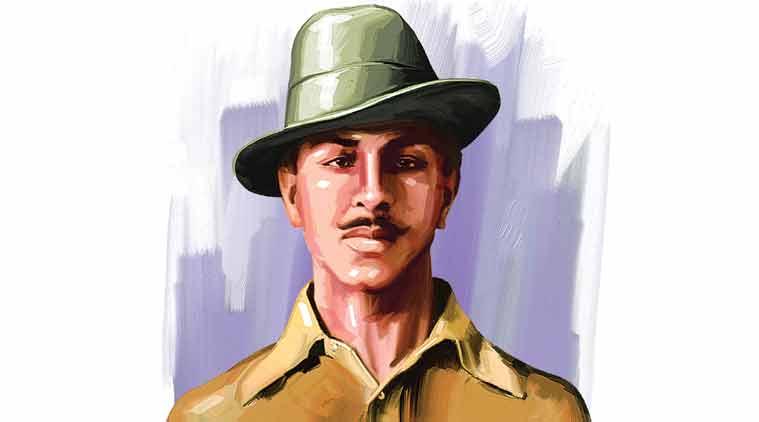Anyone with the slightest acquaintance with history, would realise that very rarely is there any ‘absolute historical truth”. The writing of the past evolves, changes and redefines itself over time.
The previous week, a celebrated book on modern Indian history, “India’s struggle for independence”, written by late Bipin Chandra along with Mridula Mukherjee, Aditya Mukherjee, K N Panikkar and Sucheta Mahajan, came under attack for its reference to Bhagat Singh as ‘revolutionary terrorist’. The book, first published in 1988, has since been taken off Delhi University (DU) history syllabus, opening up a debate among academicians and those taking offence at the usage of the term.
 “Even in today’s times, almost a century after Bhagat Singh, the description of “revolutionary terrorist” has a very different meaning from the term “terrorist”, says Romila Thapar
“Even in today’s times, almost a century after Bhagat Singh, the description of “revolutionary terrorist” has a very different meaning from the term “terrorist”, says Romila Thapar
To understand what impact an attack on a celebrated work like this has on the broader issue of history writing and teaching, Indianexpress.com consulted Dr. Amar Farooqui, professor of modern Indian history in Delhi University, and the writings of Dr. Romila Thapar (Professor Emeritus, Jawaharlal Nehru University).
Also read: What the ‘revolutionary terrorism’ of Bhagat Singh really means
“These are matters of individual academic discretion of the historian and subject to academic debate. There can be no completely ‘right’ or ‘wrong’ label,” said Farooqui. “By taking the book off the syllabus, any space for discussion or debate on the usage of terminologies one might be uncomfortable with, is being closed off.”

The profession of history writing is far from being a job of establishing facts in the sense of absolute truths. Historians introspect, debate and critically analyse each other’s interpretations of past events. “Historians give a lot of thought to what terms they use, but there can be no legislative prescription about specific terms,” explained Farooqui.
In an article published in Indian Cultural Forum, Romila Thapar wrote that “Changing the content of a book, or a demand to change the phraseology in a book, is not the business of a government or even the Vice-Chancellor of a University. It is a matter for discussion between the author/s and others in the same professional specialisation, in this case, historians.The updating of a historical study is entirely the concern of the author.”
Further, individual historians themselves do not remain static in their perceptions of the past. At different time periods, their positions on issues keep evolving, depending upon the political and social contexts impacting them, and intellectual developments in the field itself as well as other disciplines. “Historians respond to particular contexts in which they are writing. It is important for students to reflect upon these contexts rather than simply accepting every terminology and event as the immutable historical truth.”
Both Farooqi and Thapar give an example of the way the nationalist uprising of 1857 had been written about and how its understanding has changed over time. “The use of the word “rebellion” to describe the uprising can have both positive and negative connotations,” said Farooqi. When the British were writing about the episode, they used the word “rebellion” in a negative context. Nationalist historians writing on the subject continued using the same term. However, the context had changed and the usage of the word ‘rebellion’ was considered something to be proud of.
 “The use of the word “rebellion” to describe the 1857 uprising can have both positive and negative connotations,” said Farooqi.
“The use of the word “rebellion” to describe the 1857 uprising can have both positive and negative connotations,” said Farooqi.
Explaining how the usage of the term “terrorist” too has changed contexts, Thapar in her article says, “Even in today’s times, almost a century after Bhagat Singh, the description of “revolutionary terrorist” has a very different meaning from the term “terrorist”. The context of terrorist activity has changed from assassinating British officers as an act of support to the Indian national movement for independence, to the terrorist actions of today that are meant to silence people and spread fear in society. In the earlier instance, there was a particular person targeted for a particular reason. This continues in our times as we know from recent instances in India. But today’s terrorists more frequently kill people on a larger scale. This is generally random and intended only to assert power through terror and hold society to ransom.”
“Bipin Chandra has been criticised by his fellow historians too. For a long time, many Marxist historians were critical of him for attempting to downplay the role of the Left in the national movement. But instead of filing cases against him, we need to understand the events of the time which were affecting his writing. By the 1980s, ‘aggressive communalism’ had an impact upon Chandra and it affected the way he wrote,” said Farooqui.
Farooqui went on to explain further how there has never been unanimity of opinion among historians about the historical roles of Gandhi and Nehru either. “It is quite interesting to note how the understanding of the Left has evolved over time about Nehru and Gandhi. In the past many were extremely critical about both. From the 1980s-90s, we see Marxist scholars taking very different positions. This is partly because of fresh historical research that has helped to understand certain dimensions better, and partly because it is easier today for these historians to distance themselves from the times of Gandhi and Nehru. In fact left-wing intellectuals are nowadays the real defenders of Nehru and Gandhi.”
Much of what is written about the national movement, comes from individual understandings of the movement. Far from being a homogeneous struggle fighting against the colonial rule, the broad category of the national movement, had within it several contending ideologies and political trends. Many of these trends were far from being at peace with each other.
“In the case of Bhagat Singh, violence was a major issue. There was a major difference of opinion between Bhagat Singh and Mahatma Gandhi on strategy and tactics, particularly the role of violence in the struggle,” explains Farooqui. But many differences were ideological as well.
While paying tribute to the patriotism of Bhagat Singh after his execution, Gandhi disagreed with him in the following words, published in journal ‘Young India’ on March 23rd, 1931.
But we should not imitate their act. In our land of millions of destitute and crippled people, if we take to the practice of seeking justice through murder, there will be a terrifying situation. Our poor people will become victims of our atrocities. By making a dharma of violence, we shall be reaping the fruit of our own actions.
Advertisement
Once we understand these conflicts and complications within the national movement we will be able to better appreciate the different contexts that impact a historian’s writing. The history of history writing is just as important as the events and personalities in history.
Also from Express Research: Shariat and Muslim Personal Law: All your questions answered










